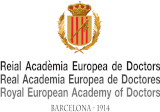
2nd session of Challenges for a new era: Can we ensure the well-being and progress of the new generations?
Venue: Assembly Hall of Catalan Labour National Works Promotion, headquarters of the RAED, Via Laietana, 32, mail floor, Barcelona
Event date: Tuesday, 21 December 2021
Event time: 18:30 h to 20:30 h
Format: Face-to-face and streaming
Event cost: Free
Participants
Moderator: Dr. José Ramón Calvo
Speakers:
- Javier Aranceta – académico de la RAED
- José María Baldasano – académico de la RAED.
- Albert Bosch – académico de la RAED
- María Àngels Calvo – Vicepresidenta y académica de la RAED.
- Jordi Martí – académico de la RAED
- Joan Francesc Pont – académico de la RAED.
- Miquel Ventura – director de proyectos de la Fundación Pro RAED.
Session content and objectives
Europe’s delicate economy is made up of a conglomerate of highly heterogeneous countries operating at different speeds. Europe has spent decades trying to be competitive on a global scale, but it is struggling to achieve its goals of growth and equitable distribution of wealth. The irruption of the pandemic in the world has hit the old continent hard, generating social insecurity and an unprecedented socioeconomic impact that, together with other environmental, ecological and technological challenges, have highlighted our fragile alliance and cast doubt on our ability to progress. This reality has required the EU Administration to inject huge amounts of economic funds to face the new economic situation that we are facing in an eco-social environment conditioned by global warming, job insecurity, and the change in the energy model. and, among other challenges, the loss of biodiversity, the aging of the population or the digitization of the world that is already entering the era of quantum computing.
European society, like the rest of the world, is missing a return to pre-pandemic “normality”, forgetting that this development model is, without a doubt, the one that has led us to the current situation.
In an overpopulated and sick planet with scarcity and limited access to natural resources on the horizon, what is the message that we can offer to new generations from the knowledge and experience that our organization harbors? What is our real commitment to help mitigate the effects of our development model? In this sense, we are the last generation that can make the planet regain its balance. But do we have the right tools? And, more importantly, are we going to be strong enough to achieve the changes we need? The debate is served and it will be exciting to reflect on it and take action to urgently contribute to building the world we need.



